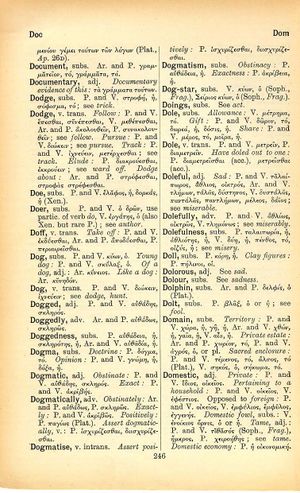dogma
ἀλεξίκακε τρισέληνε, μηδέποθ' ἡττηθείς, σήμερον ἐξετάθης → averter of woes, offspring of three nights, thou, who never didst suffer defeat, art to-day laid low
English > Greek (Woodhouse)
subs.
Doctrine: P. δόγμα, τό. Opinion: P. and V. γνώμη, ἡ, δόξα, ἡ.
Latin > English (Lewis & Short)
dogma: ătis, n. (also
I fem.: Pythagoream dogmam doctus, Laber. ap. Prisc. p. 679 fin. P.), = δόγμα, a philosophic tenet, doctrine, dogma, Cic. Ac. 2, 43, 133; id. Fin. 2, 32, 105; Mart. 1, 9; Juv. 13, 121; Vulg. Job, 13, 4 al. (in Cic. Ac. 2, 9, 27, written as Greek). —
II A decree, order (eccl. Lat.): crudele regis, Vulg. Esth. 4, 3; cf. id. Act. 16, 4.
Latin > French (Gaffiot 2016)
dogma,¹⁴ ătis, n. (δόγμα),
1 [phil.] théorie, opinion, croyance : Cic. Fin. 2, 105
2 décret : Vulg. Esth. 4, 3. arch. dogma, æ, f., Laber. 17.
Latin > German (Georges)
dogma, atis, n. (δόγμα), die Meinung, der Lehrsatz eines Philosophen (rein lat. decretum od. nachaug. placitum), Cic. u.a.: dogmata Pythagorae, Chalcid. u. Inscr. – / Akk. heteroklit. dogmam, Laber. com. 17: Abl. Plur. dogmatis, Fronto de eloqu. p. 144, 15 N.

